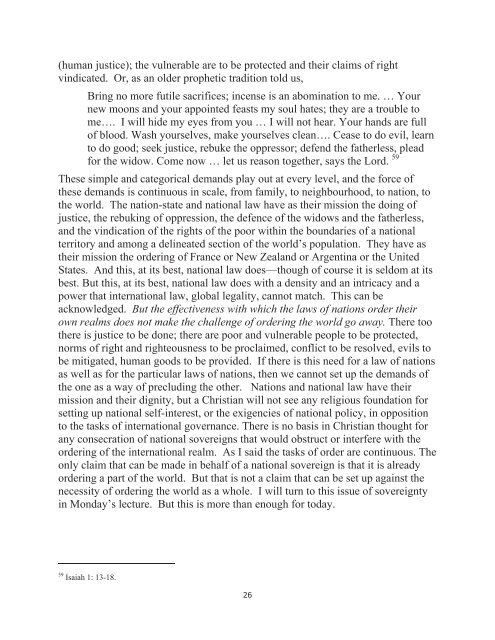International Legal Evangelism: Intelligence, Reconnaissance & Missions
International Legal Evangelism: Intelligence, Reconnaissance & Missions
International Legal Evangelism: Intelligence, Reconnaissance & Missions
You also want an ePaper? Increase the reach of your titles
YUMPU automatically turns print PDFs into web optimized ePapers that Google loves.
(human justice); the vulnerable are to be protected and their claims of right<br />
vindicated. Or, as an older prophetic tradition told us,<br />
Bring no more futile sacrifices; incense is an abomination to me. … Your<br />
new moons and your appointed feasts my soul hates; they are a trouble to<br />
me…. I will hide my eyes from you … I will not hear. Your hands are full<br />
of blood. Wash yourselves, make yourselves clean…. Cease to do evil, learn<br />
to do good; seek justice, rebuke the oppressor; defend the fatherless, plead<br />
for the widow. Come now … let us reason together, says the Lord. 59<br />
These simple and categorical demands play out at every level, and the force of<br />
these demands is continuous in scale, from family, to neighbourhood, to nation, to<br />
the world. The nation-state and national law have as their mission the doing of<br />
justice, the rebuking of oppression, the defence of the widows and the fatherless,<br />
and the vindication of the rights of the poor within the boundaries of a national<br />
territory and among a delineated section of the world’s population. They have as<br />
their mission the ordering of France or New Zealand or Argentina or the United<br />
States. And this, at its best, national law does—though of course it is seldom at its<br />
best. But this, at its best, national law does with a density and an intricacy and a<br />
power that international law, global legality, cannot match. This can be<br />
acknowledged. But the effectiveness with which the laws of nations order their<br />
own realms does not make the challenge of ordering the world go away. There too<br />
there is justice to be done; there are poor and vulnerable people to be protected,<br />
norms of right and righteousness to be proclaimed, conflict to be resolved, evils to<br />
be mitigated, human goods to be provided. If there is this need for a law of nations<br />
as well as for the particular laws of nations, then we cannot set up the demands of<br />
the one as a way of precluding the other. Nations and national law have their<br />
mission and their dignity, but a Christian will not see any religious foundation for<br />
setting up national self-interest, or the exigencies of national policy, in opposition<br />
to the tasks of international governance. There is no basis in Christian thought for<br />
any consecration of national sovereigns that would obstruct or interfere with the<br />
ordering of the international realm. As I said the tasks of order are continuous. The<br />
only claim that can be made in behalf of a national sovereign is that it is already<br />
ordering a part of the world. But that is not a claim that can be set up against the<br />
necessity of ordering the world as a whole. I will turn to this issue of sovereignty<br />
in Monday’s lecture. But this is more than enough for today.<br />
<br />
59 Isaiah 1: 13-18.<br />
<br />
26

















